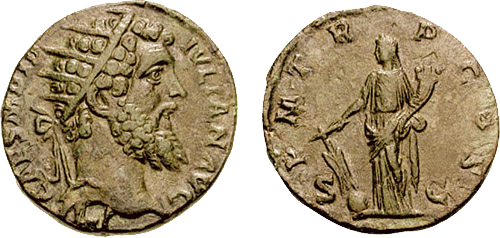January 30, 2016, by Will Leveritt
On this day in AD133 the emperor Didius Julianus was born
Text by Benedict Segal
On this day in AD 133 the future emperor, Marcus Didius Severus Julianus, commonly known simply as Didius Julianus, was born in Mediolanum (modern-day Milan).¹ Julianus is an intriguing individual, and his journey to becoming emperor was a controversial one.

AR dupondius of Didius Julianus. Obverse has radiate head r., IMP CAES M DID IVLIAN AVG. Reverse has Fortuna standing with rudder on globe, cornucopia in left. P M TR P COS, S C. Image attribution: Classical Numismatic Group, Inc. http://www.cngcoins.com.
His father, Quintus Petronius Didius Severus, came from a high-profile family of Mediolanum; his mother, Aemilia Clara, from a consular family of North African origin. He also had two brothers, Didius Proculus and Nummius Albinus.
The Historia Augusta claims that in his formative years Julianus was raised by Domitia Lucilla, mother of the emperor Marcus Aurelius. It is said that with her assistance, he was appointed at a very early age to the vigintivirate (a board of twenty minor magistrates). At an unknown point he married Manlia Scantilla, and in 153 she gave birth to their daughter and only child Didia Clara.
It seems that the imperial family continued to help his political career as he started to make his way up the cursus honorum. He held the office of quaestor a year before the legal minimum age, and later Marcus Aurelius recommended him for the aedileship and then for the praetorship.
Thereafter, he took command of the Legio XXII Primigenia, stationed on the border with Germania before being transferred to govern the province of Gallia Belgica. Then in 175, after having skilfully repulsed an invasion of the Chauci (a Germanic tribe) during his governorship, Julianus was raised to the consulship alongside the future emperor (and his predecessor), Pertinax.
After this he was assigned yet more governorships – of Dalmatia, of Germania Inferior, and, apparently, of Bithynia also – in the first two of which he scored further military successes. His final post was the prestigious governorship of Africa Proconsularis, strangely enough succeeding Pertinax, as he was to do as emperor.
At this point in his career, under the reign of Commodus, we hear dark rumours from Cassius Dio about possible revolutionary tendencies on Julianus’ part. Whatever these may have been, Dio says that Commodus exiled him to Milan. The Historia Augusta also mentions an accusation made against him of conspiring against Commodus (which may or may not be the same episode as that in Dio). These notes seem to hint at the size of Julianus’ ambition.
If Julianus was indeed harbouring a desire for the emperorship, his desires would be realized in 193. Dio claims that after the murder of Pertinax by the Praetorian Guard in March that year, Julianus went immediately to their camp on the outskirts of Rome and began to offer to pay his way to ultimate power.
This seems to have given Pertinax’ assassins an idea, and they announced that the throne would be handed over to whoever would offer them the most money for it. For Dio this represents a most shameful episode in the story of Rome; nor should be surprised that Julianus was one of those who began making bids, if we can trust Dio’s characterization of him as simultaneously greedy and profligate.
Competing only with the father-in-law of the murdered emperor, Titus Sulpicianus, Julianus’ greater wealth allowed him to offer the soldiers 5,000 more sesterces each than his rival, and on the 28 March 193 the Guards threw open the gates and saluted Julianus with the name of Caesar and proclaimed him emperor.
An extremely unpopular leader (Dio provides what he at least claims is an eyewitness account of this), it was not long before three governors – Clodius Albinus, Pescennius Niger, and the future emperor Septimius Severus – revolted and each sought to take control of the Empire.
Dio says that once it became clear that Severus was approaching Rome, the Senate decalred Julianus a public enemy. The result was that on 1 June, AD 193, he was killed in the imperial palace by one of his soldiers, a little over 2 months into his reign. His last words are said by Dio to have been a lament that he had committed no evil, and killed no one.
¹Some uncertainty exists about the exact year of Didius’ birth: Cassius Dio, gives 30 Jan, AD 133 as the date; the notorious Historia Augusta, a fourth century AD work which provides biographies of the emperors from Hadrian onwards, gives AD 137 as the year, and claims a different date (2 February). As a contemporary of the emperor, Dio’s dating is probably to be preferred.
No comments yet, fill out a comment to be the first

Leave a Reply